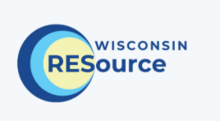Birth to 3 Program: Professional Development
Please join us at our statewide Wisconsin Birth to 3 Program professional development website, EI in WI. EI in WI is the hub for the Wisconsin Birth to 3 Program’s professional development system. There, you will find:
- Learning opportunities
- National and “homegrown” resources and materials
- Opportunities to collaborate with peers
- Upcoming professional development events
Be sure to visit EI in WI often. New opportunities and materials are being added regularly. We’ll see you there!
What is RESource?
Wisconsin RESource provides ongoing professional development and support to county Birth to 3 programs through the EI in WI website. They make sure that programs and staff are connected and prepared.
With the goal of improved outcomes for children with disabilities and their families, the RESource team supports:
- Education of leaders and home visitors in the Birth to 3 Program.
- Equal access to high quality early intervention services.
- Effective interventions and strategies.
- Connections with other systems in the state.
CESA5 RESource Project
626 E. Slifer St.
Portage, WI 53901
RESource Director Michelle Davies
Email: daviesm@cesa5.org
Phone: 608-745-5403


